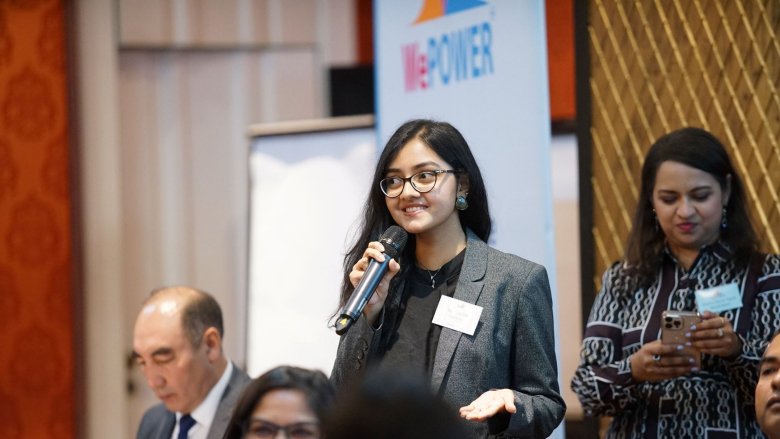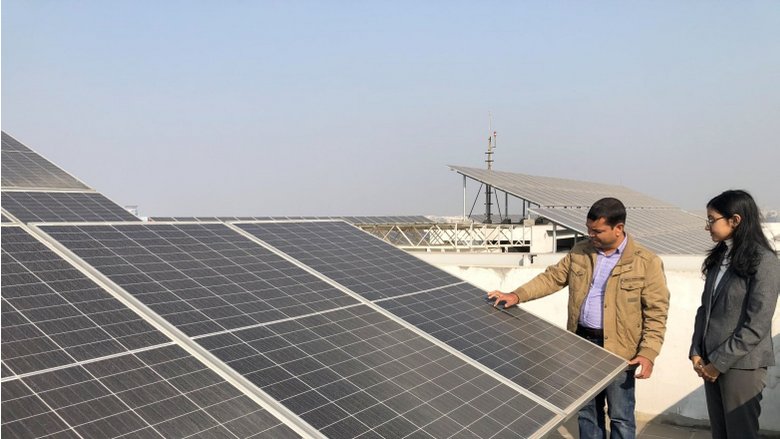Mohsina is a 22-year-old electronics graduate. She was one of the youngest participants selected for the (World Bank-supported) Shoktikonna Leadership program, a training for women in the energy sector. In Bengali, Shaktikonya means Power Girl. She did an internship with Grameen Shakti – an organization providing Sustainable Renewable Energy solutions to rural Bangladesh. She currently is doing a traineeship with a telecommunications company, where she will work on sustainable digital solutions. Mohsina is an inspiration, and she is an example of the promising future for STEM and renewable energy in countries like Bangladesh – and what networks like WePOWER can do to support women and girls like her.

A 22 year old electronics graduate, Mohsina Taz was one of the youngest participants selected for the World Bank-supported Shoktikonna Leadership program, a training for women in the energy sector. Credit: WePOWER
“WePOWER has given me exposure at a high level, and I want to expand it.”

Mohsina is an inspiration, and she is an example of the promising future for STEM and renewable energy in countries like Bangladesh. Credit: WePOWER
Where did your interest in energy and sustainable energy start?
STEM is something that I chose because of my interest and my passion, and I had the support of my family. Luckily, during my fourth and final year at BRAC University, I came upon Shoktikonna and dove into renewable energy. It is a very big topic in my country, as we are going through an energy crisis.
What was your experience in STEM like?
The number of girls in class was low. In an electrical engineering classroom with forty-five students, there would be four to six girls. It is improving, with more girls enrolling in engineering nowadays. The challenge is the perception of our capacity. We go through the same recruitment process and take the same tests, but guys still have the notion that we have it easier.
This is a bias that we sometimes get in the classroom. Even in 2023, some guys do not prefer a girl in their group because they think that we won't be good with the technical stuff. That is difficult, because we have to work in groups quite often, which is a great way to acquire technical knowledge beyond your textbooks.
Another challenge is the lack of exposure. That is something I got thanks to the Shoktikonna Leadership Program and the WePOWER Network. Before that, I really didn't see much female figures being given that exposure. There are very prominent, talented, and established female leaders in these areas. But when we had a seminar at our university about a technical job or power class, they don't send women as panel speakers. So, they also give us the perception that it's a male dominated industry. And if I don't learn about support or facilities that exist for me at work, how will I make it in my profession?
How has the situation for women and girls in STEM changed over the years?
Things are improving. But the problem is getting exposure to the right people. The exposure that I got through Shoktikonna and WePOWER Network is something other engineering science students would like to have, because it is so inspiring and motivating to see that other women in the industry have overcome challenges before you. It is so important to give those who have made significant changes regarding gender equality the floor.
Something I noticed is that even if we have female policies, these decisions are mostly made by men. Why not by us? Hearing it from us women is much more efficient than you deciding for us what is right or wrong. We are the ones who are facing the problems.
In the workplace, there could be discrimination in the recruitment process. People might think that you have it a bit easier – or doubt your potential – just because you're a girl. Top level management makes statements about gender equality, but it's all talk. The value of respecting each other should also become ingrained in the employees.
I've heard that women weren't invited to important meetings. At some point this can be very demotivating: guys do not invite you when they take numerous breaks, or do not approach you at the office. I personally believe that men should also be the participants in women’s empowerment sessions. They must understand it, because this is not only a problem that we [women] are facing. I'm sure if they have the opportunity, they will stand up for us.
A common problem with girls in this region is that after graduation, there's pressure of marriage from some of the families. We can see that even if there's a high percentage of female students in universities, a lot of the times, they don't start their career. It's not always their decision.
And there can be a lack of support at the organization too. They ask you about your maternity leave. I’ve gotten questions in the recruitment process on whether I'm in a relationship or not, because they were worried about my emotional stability. I have no idea why they didn't ask the male participants.
It is also a matter of the work division in the household. Gender shouldn't be the limiting factor here. I want to improve things so that people don't even think of being a woman as a burden – at home, at school, or at work.
Technology as leverage for gender equal opportunities
This year’s International Women's Day theme was ‘DigitALL: Innovation and technology for gender equality’. What do you think are the biggest opportunities for women in the next ten years?
The digital era has gone to the next level, especially during the COVID pandemic. The upward curve has been steep across many industries. Sustaining our leadership qualities and technical knowledge is very important for women right now.
Technology creates more opportunities to train people. I think it is important to give hands-on training. Because even if people do not have a degree, I can go to rural areas and teach them how to use a handset; how to use a solar system; how to harvest this energy; charge their phone and use that phone to conduct their business. That way, women can have a stable income, and grow their business. I think small trainings like that should be established for everyone, not only not only people who are operating in this field.
If we can keep women – also in rural areas – on board with the proper training in the digital age, we can have gender balance. And in fact, I think we will have equal opportunities, because access has become much easier with technology.
The legacy of those who have gone before creates hope for the future.
I admire you and the women that came before you, because that does not sound like an easy environment. How did you learn to be so brave and self-confident to stand your ground?
As women, we have to go the extra mile to prove ourselves. It shouldn't be necessary. But I see a future where gender bias vanishes – where we no longer need to talk about gender issues at all. There are so many places that are helping us to facilitate our journey. We all must change. With the right opportunities and encouragement, we can achieve it!
It has been very meaningful for me to give my input, especially at this young age. WePOWER has given me the opportunity to have exposure at a high level, and I want to expand it. I speak about it to my juniors and every person that I encounter. WePOWER has become a part of my identity now. It's shaping my career and it has given me such a strong foundation and the confidence to continue in STEM and renewable energy, because I've met people who are constantly tackling challenges and making meaningful policy changes to make it easier for us [girls and women]. And that is such a great inspiration! Thanks to this, I do not see a time where women will not be in STEM. I see a future where the ratio is equal.
Interview by Iris Weges
Learn more about WePOWER
Learn more about the Shoktikonna Leadership Program
